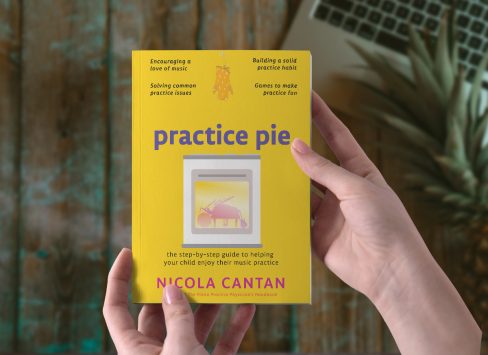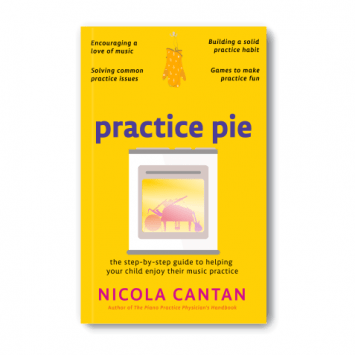My new book is now available for pre-order in ebook format in many online bookstores. If you prefer a hard copy, you’ll be able to order that from August 23rd.
This book is a short guidebook to music practice for parents. I think it would be a very good one to keep around the studio to loan to parents or to include in a new parent welcome packet.

I made this book short on purpose. I want parents to be able to read it in an hour or so and not feel overwhelmed by the content. That poses one sticky issue with online book stores, however. As an author, I have no control over the preview, it is just a percentage of the total length. So for this book – it basically just shows the content! I hope that the excerpt below gives you a better idea of the content if you’re considering purchasing the book.
The following is an excerpt from ‘Practice’ Pie by Nicola Cantan.
Introduction
Accept Your Apron
Why Bake a Practice Pie?
So you’ve picked up this book (or someone put it in your hand) and cracked the spine. Congratulations! You’re already taking a step that many parents never will. You’re thinking about how to best support your child in their musical journey.
However, I doubt you’re fully on board yet. You value music, sure. You know how many benefits it has for your child’s development and emotional wellbeing, and how enriching it could be in their life.
But do you really have to bake a metaphorical practice pie? That sounds like a whole lot of effort and time you don’t really have. Isn’t there a store-bought option or, better yet, a home delivery service for practice pie?
Unfortunately not. You might luck out and have one of those kids who manages to muddle through and find their own motivation and methods of practising. But I can tell you from experience that those kiddos are less than 1% of the population. And those that don’t naturally go to their instrument to practise of their own volition or practise in constructive ways week after week and year after year are no less “talented” or “musical”. They just need a little help.
If your child can’t bake alone…
I chose the pie analogy for this book for many reasons. I like how it encourages us to see things in layers and that the process is iterative – you can always return to the mixing bowl and start a new pie. It’s also fun and silly, and I hope that element brings some playfulness into the practice process, since it can be a point of tension in many families.
But another reason I want you to picture the perfect practice pie is so that you understand how complex this is for your child. If someone gave you a recipe, you have enough adulting skills to follow it and bake the pie. Even if you have a baking aversion, I don’t think we need to fear that you’ll set fire to the house or cause yourself irreparable harm.
Depending on the age of your child, however, you most likely wouldn’t let them bake a pie alone. If they’re six, you might get them involved with the stirring and have them help you pour the filling into the crust. If they’re nine, maybe they can chop the apples with your supervision and set the timer according to the recipe. You want them to feel that they are doing it themselves but within the safety of your guidance.
Chances are, though, even if they’re 12 years old, you’re not going to give them the recipe book and then leave them alone at home to bake for the very first time. They are children and they need your help to bake a safe pie, let alone a perfect one.
Practising music is less dangerous but no less complex. In order to practise consistently and effectively, your child will need to organise their schedule to find a time for practice every day, read the teacher’s instructions, and follow the directions while knowing when to change course, as issues arise. Most kids cannot do that. Even most teens will need some help with the scheduling part.
Leave it up to your kiddo and there will probably be no practice pie at all. If you’re very lucky, there might be some cereal smushed into a pie dish with whipped cream on top. Yum.
Music is Fun
So now we’re left with the question we started with: Why bake a practice pie at all? You probably wanted your child to start music lessons because:
- It’s a fun hobby.
- They asked for lessons.
- You value music education.
- It will help them develop grit.
Maybe it’s a mix of all of those. They are all valid and all excellent reasons to learn music. But really, the first one is the most important. If you make it fun, they will learn more and develop determination and grit over time, as well as reap all the other wonderful benefits of learning music. Fun is the magic ingredient.
To maximise the fun, they need to practise.
This may be a surprise to you. Parents and kids having arguments and groaning matches about music practice is practically a trope at this stage. You might think that if your child has fun in music lessons first, the practice will stem from that. But practice is actually how you have more fun in music.
Let’s set our pie ingredients aside for a moment and visit the language department. Imagine you wanted to learn Italian. You love the language and you’ve heard it’s one of the easiest to start with, so you sign up for lessons at your local community centre on Monday evenings. The first week goes great. You learn some simple vocabulary about ordering a coffee and practise it together in the class.
The next Monday you come to your lesson expecting to have just as much fun, but after some pleasantries the teacher launches into a café role play and you’re flummoxed. You can’t remember a single word from last time and you just stare back at her blankly. She repeats her question three times…but you have no idea what she’s saying or how to reply. She’s clearly a bit surprised you don’t remember anything from last week, but she’s kind about it and spends the rest of the lesson reviewing the vocabulary from last week.
Now imagine the same thing happens the following week, and the week after that. It feels as if your mind has been erased of all Italian in the six days between classes. How long would you stick with these lessons if you weren’t getting anywhere?
I’m not trying to say that a music student who doesn’t practise won’t make any progress at all or that a teacher will make them feel bad if they don’t. But it’s a lot more fun when you feel like you’re getting somewhere. It’s that forward momentum that will eventually cause your child to become self-motivated to practise and work hard at music even when it’s difficult.
So the equation is not:
If my child enjoys music,
then they will practise.
It’s:
If my child practises,
they’re more likely to enjoy music.
I know that might take some mental adjustment so take a little time to let it sit.
When you’re ready, let’s get started on that pie so your child can enjoy delicious musical goodness for years to come.

Get the Book
You can preorder the book from Amazon, Kobo and other ebook stores. Just search for “Practice Pie” or “Nicola Cantan”.
If you do get a copy, please leave a review afterward! Positive reviews are the most important thing you can do to help an author spread their work.
This is a great idea, and I know my piano parents would benefit from reading this book. I look forward to getting a few copies!
Thanks, Mary!
Great excerpt and so spot on. I’m a practice parent and looking forward to getting my e-book rightaway!
Yay! Thank you, Yi Lin!
This looks great Nicola. I am not am eBook reader so I really hope it will be available hardcopy in the U.S. soon.
It will be out August 23rd!
I’m also excited to share this with my parents when hard copies become available in the US.
I will be waiting for the hard copy. This will be a wonderful resource to hand to new parents! Thanks!!!!
Wow, Nicola. This is great! So perfectly put the kids who practice will enjoy music more. Definitely on my way to order it now. Thank you.
This looks great. Hard copy would be good but I will encourage my parents to get the e-book.
This looks wonderful. The analogy of baking something is so creative!